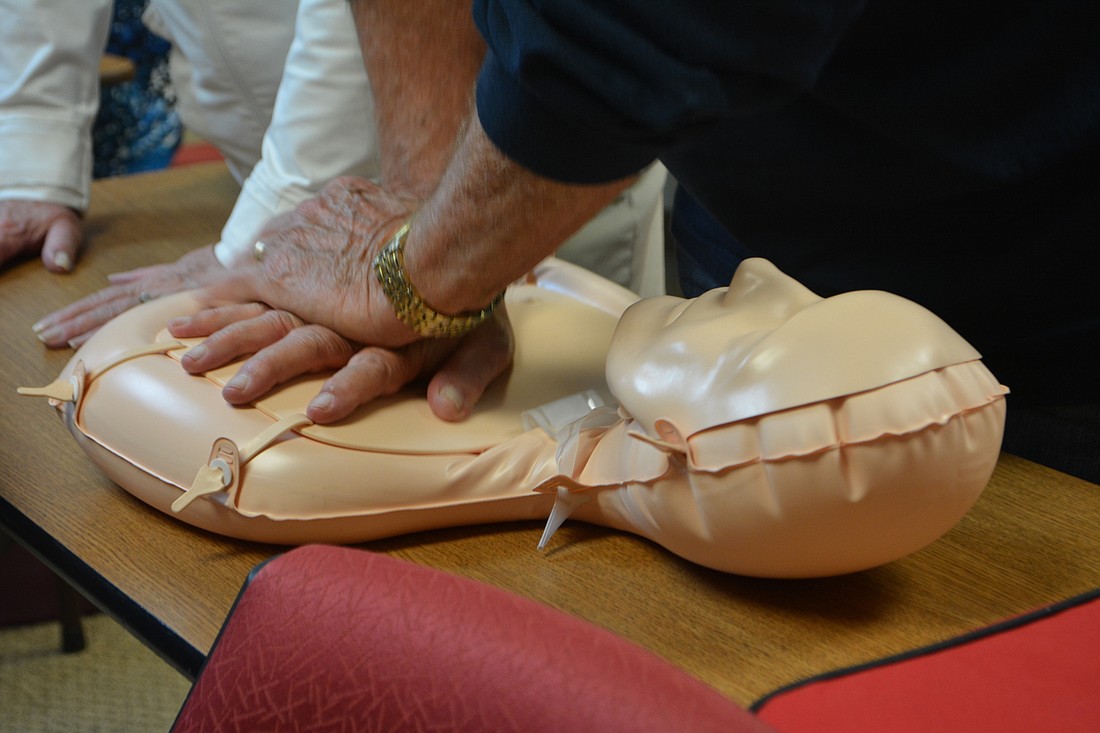- April 24, 2024
-
-
Loading

Loading

You don’t have to be a first responder to help save lives. You just have to be in the right place — with the right knowledge — at someone else’s wrong time.
That is the message behind the Longboat Key Fire Rescue Department’s hands-only CPR and AED training, which is offered free to the public a few times a year at the fire station at 5490 Gulf of Mexico Drive. According to department liaison Tina Adams, the department has provided training to more than 2,000 people through the hourlong program, now in its fourth year.
The 2 p.m. session on Jan. 23 started with a presentation that includes some background information on cardiac arrest and hands-only CPR.
The first step is always calling 911. If more than one person is present, someone can call while the other begins chest compressions. But if you’re alone, you should always make sure you call 911 first, because CPR is very tiring work that is best performed by professionals.
Also, you shouldn’t stop if you hear the victim make a strange slurping or gasping sound. Nothing but distinct breathing will do.
One of the first topics discussed was why people might be afraid to perform CPR. The possibilities ranged from fear of harming the victim further to uncertainty over legal consequences. But Good Samaritan laws protect anyone performing CPR. As for fear of causing further harm?
“Better than dead,” firefighter/paramedic William Lewis said to a few laughs. “You can’t hurt a dead person. You can’t make them more dead.”
If you’re wondering where mouth-to-mouth comes in, it doesn’t. According to Lewis, lay people should not use mouth-to-mouth when performing CPR because it takes away from the amount of time that is spent giving chest compressions, which is the step that keeps a victim’s blood circulating to their brain and heart.
You should also send someone to get an AED if possible.
“If your association doesn't have one in their public place, that's something maybe you should bring up to your board members about purchasing one for the lobby area, the pool area, your gym workout area,” firefighter/paramedic Jay Gosnell said. “We do have some success stories from on-duty maintenance managers deploying their AEDs and shocking patients on tennis courts, and those people walking out of the hospital a week later.”
The second half of the session consisted of hands-on work practiced on dummies. Chest compressions should be given at a rate of about 120 per minute. The oft-heard advice that the beat of “Stayin’ Alive” by the Bee Gees provides a good metronome for hands-only CPR is still valid, although Cyndi Lauper’s “Girls Just Wanna Have Fun,” at 119 beats per minute, is closer to ideal.
Compressions should be made about two inches deep, or one-third the depth of the chest. You can use one hand for smaller children and two fingers for infants, as opposed to the two-handed approach you would use for grown people. It’s also vital that people performing CPR take all their weight off the victim’s chest between each compression, allowing the heart a chance to refill completely.
Firefighters answered questions throughout the session. They even gave a demonstration of the Heimlich maneuver at the end of the hour.
If you would like to sign up for a session at the Longboat Key fire station, the Feb. 11 sessions are filled up, but an additional two sessions have been scheduled for Feb. 20. There are seats available at 11 a.m. and 2 p.m. Space is limited, so email Adams at [email protected] or call (941) 316-1944 to RSVP. The department can also schedule sessions at associations that request it, time permitting.